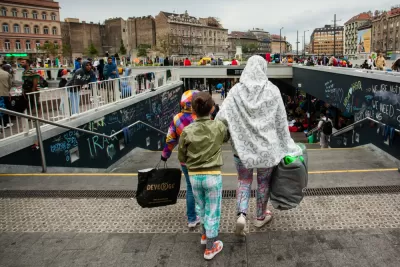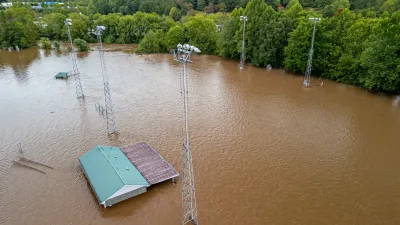"Humanitarians are conditioned to think about people, urban planners are conditioned to think about how the place affects people."

Increasingly, humanitarian crises are found in dense urban areas. Urban planner and International Rescue Committee worker Samer Saliba offers key urban planning insights to improve preparedness and response.
"Often, the most vulnerable people are moving to the most at-risk areas of cities-a problem exacerbated by climate change and the increasing risk of natural disasters. Similarly, the majority of forced migrants (refugees and internally displace) today are in urban non-camp settings."
Humanitarians must consider the importance of non-traditional actors, including civic and political agencies.
"To properly respond to urban crises, humanitarians must acknowledge political influences and appropriately work with political partners in order to achieve feasible solutions with greater reach. This does not mean abandoning humanitarian principles. It just means recognizing others as well… Ensuring the most vulnerable access the services they need in a way that improves those systems for all brings together urban planner and humanitarian objectives."
Saliba cites the Big U proposal to build a storm wall around lower Manhattan as well as the outdoor escalators of Medellin as examples of infrastructural projects that can improve the lives of a city’s most vulnerable populations.
Many planning principles are already embedded in humanitarian best practices. "Each seeks a higher quality of life for those they serve and each tries to improve on how it's done."
FULL STORY: Ten urban planning principles every humanitarian should know

Maui's Vacation Rental Debate Turns Ugly
Verbal attacks, misinformation campaigns and fistfights plague a high-stakes debate to convert thousands of vacation rentals into long-term housing.

Planetizen Federal Action Tracker
A weekly monitor of how Trump’s orders and actions are impacting planners and planning in America.

In Urban Planning, AI Prompting Could be the New Design Thinking
Creativity has long been key to great urban design. What if we see AI as our new creative partner?

How Trump's HUD Budget Proposal Would Harm Homelessness Response
Experts say the change to the HUD budget would make it more difficult to identify people who are homeless and connect them with services, and to prevent homelessness.

The Vast Potential of the Right-of-Way
One writer argues that the space between two building faces is the most important element of the built environment.

Florida Seniors Face Rising Homelessness Risk
High housing costs are pushing more seniors, many of them on a fixed income, into homelessness.
Urban Design for Planners 1: Software Tools
This six-course series explores essential urban design concepts using open source software and equips planners with the tools they need to participate fully in the urban design process.
Planning for Universal Design
Learn the tools for implementing Universal Design in planning regulations.
Gallatin County Department of Planning & Community Development
Heyer Gruel & Associates PA
JM Goldson LLC
Mpact (founded as Rail~Volution)
City of Camden Redevelopment Agency
City of Astoria
Jefferson Parish Government
Camden Redevelopment Agency
City of Claremont





























